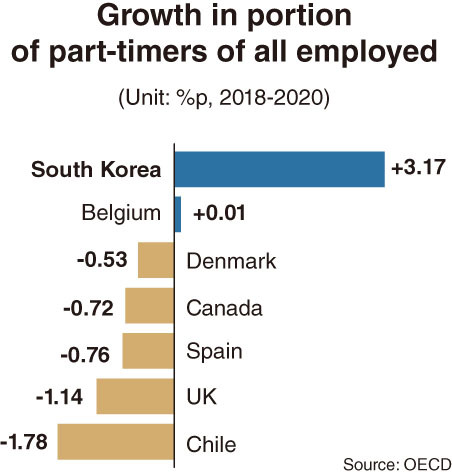[News Focus] Korea No. 1 in growth of part-timer portion in OECD
By Kim Yon-sePublished : July 20, 2021 - 18:00

SEJONG -- South Korea recorded the highest growth in the percentage of workers in part-time positions among 34 members of the Organization for Economic Cooperation and Development in the past two years.
In its analysis on the part-time workers by the Paris-based organization for its members, 15.37 percent of all employed Koreans aged 15 or over had part-time job status as of 2020.
Compared to 2018, when the figure stood at 12.2 percent, this marked a surge of 3.17 percentage points in only two years. Korea topped the list in growth among the 34 economies, while Australia, Germany and the US were not included in the comparison of the total 37 members.
The OECD defines part-time employment as people in employment -- whether employees or self-employed -- who typically work less than 30 hours per week in their main job.

Some people in Korea, including government officials, might argue that the climbing percentage is attributed to increased economic activity among young people in their late teens or early 20s and those aged over-60.
But it could also suggest that more Koreans had to endure relatively weak job security as nonregular workers.
Only 12 of the 34 countries saw the percentage of part-time workers increase over the 2018-2020 period.
Chile recorded the biggest drop, by 1.78 percentage points from 17.84 percent to 16.06 percent. Ireland saw the second-biggest drop with minus 1.54 percentage point growth, while Slovenia had minus 1.45 and Lithuania had minus 1.27.
Among the next on the list were Israel with minus 1.16 percentage points, the UK with minus 1.14, Colombia with minus 0.96, France with minus 0.89, Portugal with minus 0.87, New Zealand with minus 0.84 and Spain with minus 0.76.
Except for Korea, Japan (with a 1.85 percentage point climb) and Turkey (with 1.4), increases were less than 1 percentage point -- such as plus 0.56 percentage point in Sweden and 0.72 in Mexico.
There is a high possibility that the part-timer proportion among Korean employees will continue to rise in the wake of drastic hikes in the minimum wage under the Moon Jae-in administration, alongside the COVID-19 pandemic.
In a similar vein, Korea ranked second in the portion of temporary workers of the total salaried jobs in 2020, with 26.1 percent, among 35 OECD members. Of the total 37 members, two -- Israel and Mexico -- were not included in the organization’s analysis.
It ranked fourth by this metric among 35 OECD members in 2019 (with 24.4 percent) and seventh (with 21.2 percent) in 2018.
A temporary employee refers to a salaried worker whose job has a predetermined termination date, according to the OECD definition. People in this category, alongside part-time or contract workers, are classified as “nonregular workers” in Korea.
Over the corresponding two years, Korea overtook the Netherlands, Portugal, Poland, Spain and Chile in its reliance on temporary labor.
The figure for Korea was quite high compared to the European Union average of 13.6 percent, the OECD average of 11.4 percent and the Group of Seven average of 8.6 percent as of 2020. It is also far higher than the figures held by neighbors in the Asia-Pacific region: 15.4 percent in Japan and 7.6 percent in New Zealand.
Most emerging economies in the OECD posted figures lower than Korea’s. Slovenia and Turkey stood at No. 17 and No. 19, respectively, on the list, with temporary workers making up 10.9 percent and 10.8 percent of all salaried workers.
By Kim Yon-se (kys@heraldcorp.com)



![[Exclusive] Korean military set to ban iPhones over 'security' concerns](http://res.heraldm.com/phpwas/restmb_idxmake.php?idx=644&simg=/content/image/2024/04/23/20240423050599_0.jpg&u=20240423183955)

![[Graphic News] 77% of young Koreans still financially dependent](http://res.heraldm.com/phpwas/restmb_idxmake.php?idx=644&simg=/content/image/2024/04/22/20240422050762_0.gif&u=)



![[Pressure points] Leggings in public: Fashion statement or social faux pas?](http://res.heraldm.com/phpwas/restmb_idxmake.php?idx=644&simg=/content/image/2024/04/23/20240423050669_0.jpg&u=)









